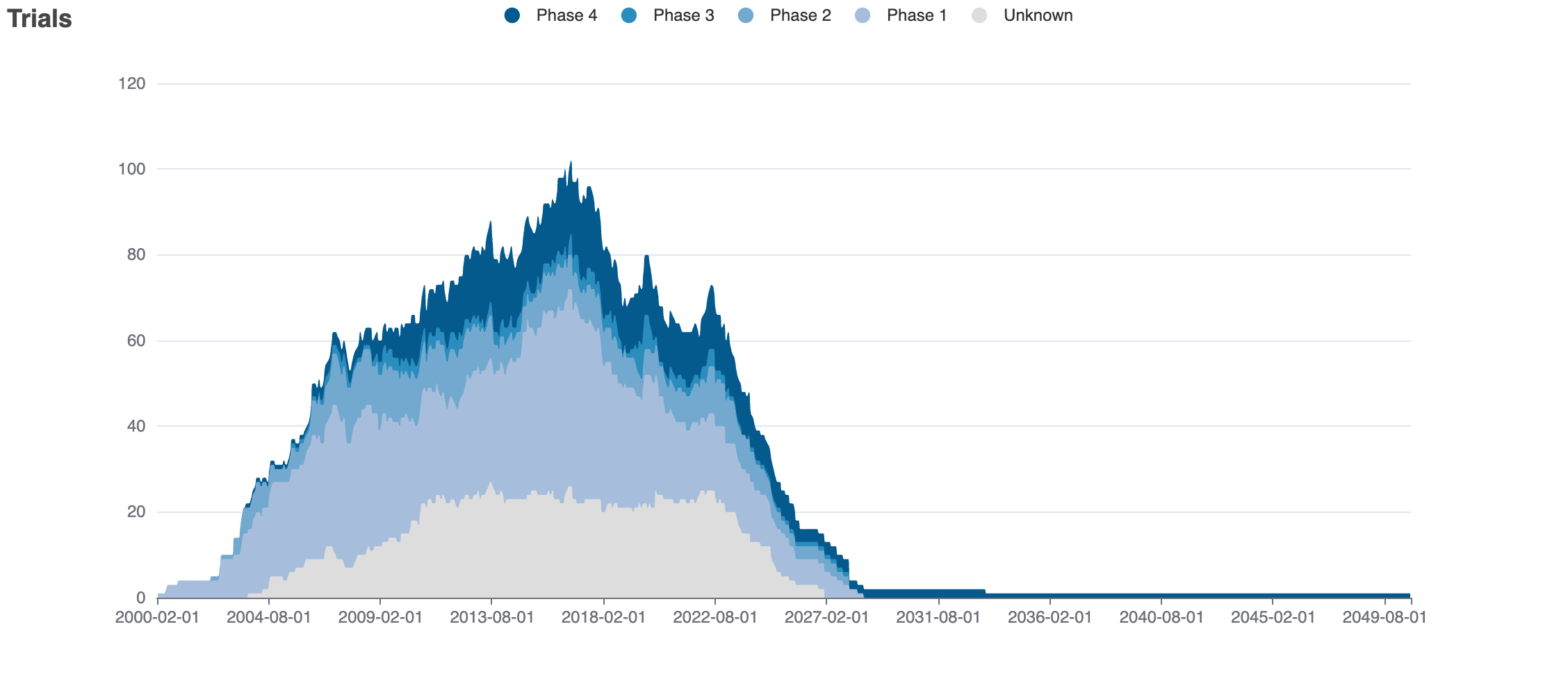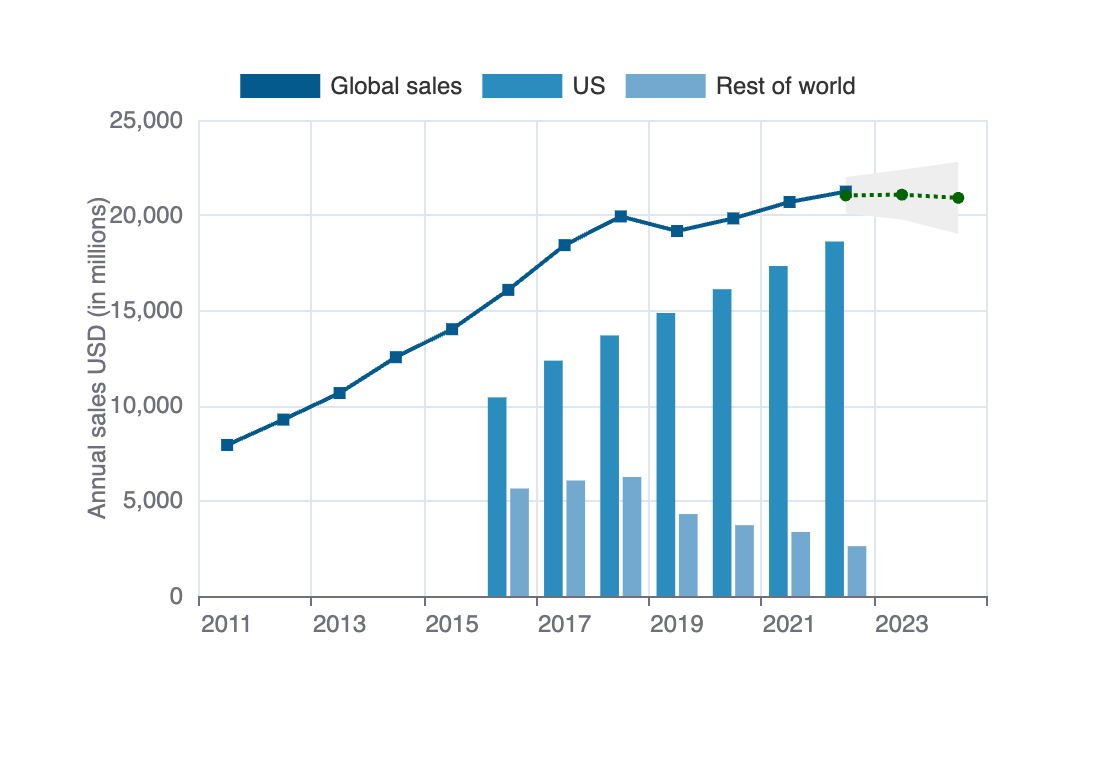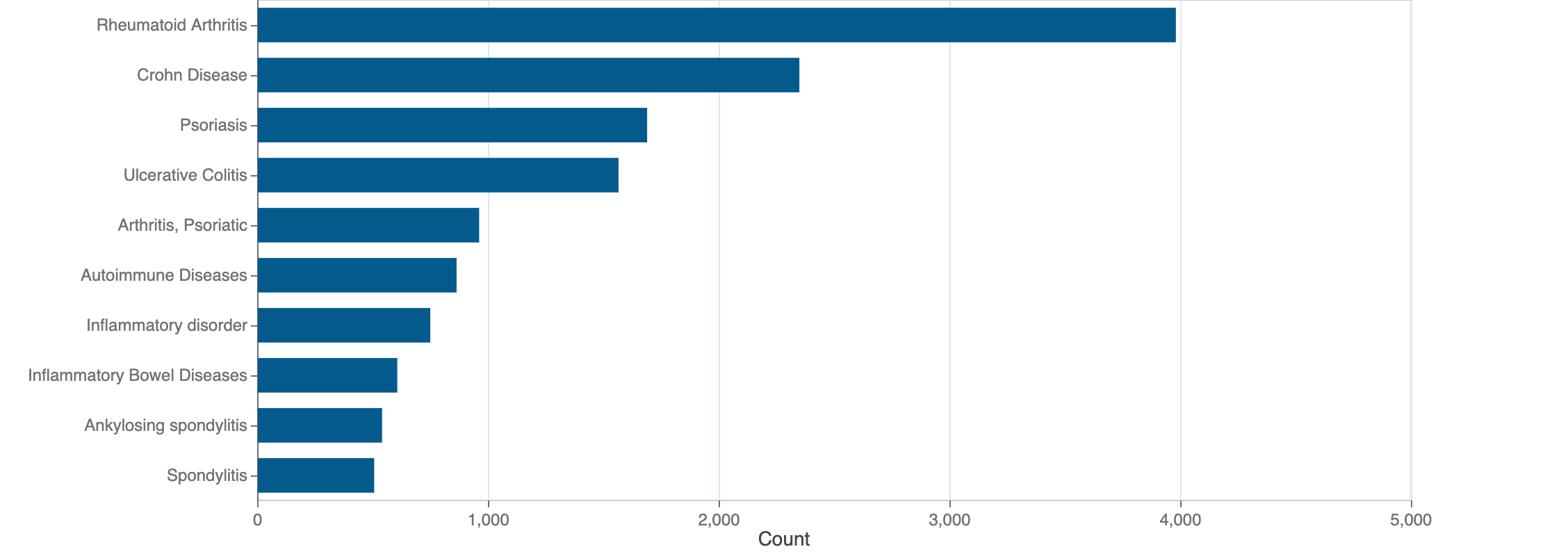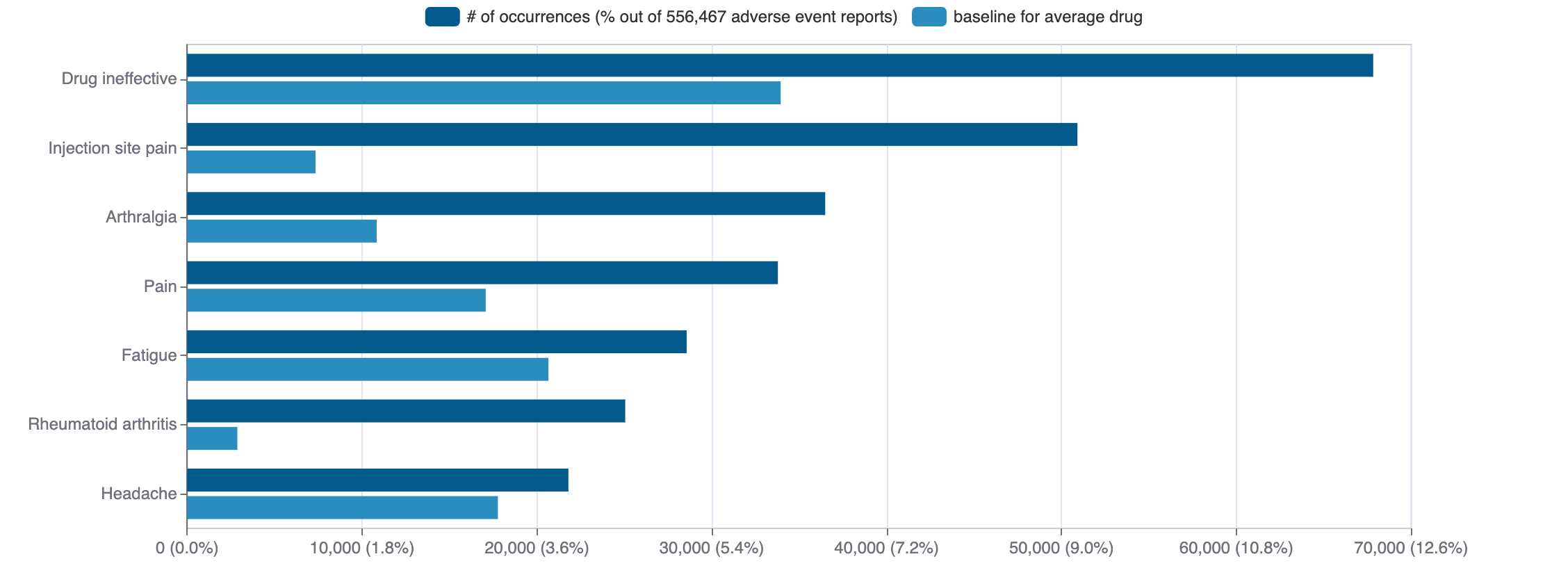Inlyta(axitinib)
Inlyta (axitinib) is a small molecule pharmaceutical. Axitinib was first approved as Inlyta on 2012-01-27. It is used to treat renal cell carcinoma in the USA. It has been approved in Europe to treat renal cell carcinoma. The pharmaceutical is active against vascular endothelial growth factor receptor 2. In addition, it is known to target serine/threonine-protein kinase PLK4.
Download report
Favorite
Events Timeline
Commercial
Clinical
Drug
Target
Variants
Financial
Trends
Safety
Events Timeline
5D
1M
3M
6M
YTD
1Y
2Y
5Y
Max
Events
FDA approval date
EMA approval date
Patent expiration date
Study first post date
Last update post date
Start date
Primary completion date
Completion date
Results first post date

Mock data
Subscribe for the real data
Subscribe for the real data
Commercial
Therapeutic Areas
Therapeutic Area | MeSH |
|---|---|
| neoplasms | D009369 |
| urogenital diseases | D000091642 |
Trade Name
FDA
EMA
Axitinib, Inlyta
Drug Products
FDA
EMA
New Drug Application (NDA)
New Drug Application (NDA)
Abbreviated New Drug Application (ANDA)
Abbreviated New Drug Application (ANDA)
Axitinib
Tradename | Company | Number | Date | Products |
|---|---|---|---|---|
| INLYTA | CV Sciences | N-202324 RX | 2012-01-27 | 2 products, RLD, RS |
Labels
FDA
EMA
Brand Name | Status | Last Update |
|---|---|---|
| inlyta | New Drug Application | 2025-02-19 |
Indications
FDA
EMA
Indication | Ontology | MeSH | ICD-10 |
|---|---|---|---|
| renal cell carcinoma | EFO_0000376 | D002292 | — |
Agency Specific
FDA
EMA
No data
HCPCS
No data
Clinical
Clinical Trials
230 clinical trials
View more details

Mock data
Subscribe for the real data
Subscribe for the real data
Indications Phases 4
Indication | MeSH | Ontology | ICD-10 | Ph 1 | Ph 2 | Ph 3 | Ph 4 | Other | Total |
|---|---|---|---|---|---|---|---|---|---|
| Renal cell carcinoma | D002292 | EFO_0000376 | — | 16 | 52 | 13 | 1 | 24 | 99 |
| Kidney neoplasms | D007680 | EFO_0003865 | C64 | 4 | 12 | 5 | 1 | 8 | 29 |
| Immunotherapy | D007167 | — | — | — | 2 | — | 1 | — | 3 |
| Radiotherapy | D011878 | — | — | — | 1 | — | 1 | — | 2 |
Indications Phases 3
Indication | MeSH | Ontology | ICD-10 | Ph 1 | Ph 2 | Ph 3 | Ph 4 | Other | Total |
|---|---|---|---|---|---|---|---|---|---|
| Carcinoma | D002277 | — | C80.0 | 10 | 41 | 3 | — | 11 | 60 |
| Neoplasms | D009369 | — | C80 | 17 | 10 | 2 | — | 4 | 31 |
| Non-small-cell lung carcinoma | D002289 | — | — | 4 | 11 | 2 | — | — | 13 |
| Macular degeneration | D008268 | EFO_0001365 | H35.30 | 3 | 2 | 2 | — | 1 | 7 |
| Wet macular degeneration | D057135 | EFO_0004683 | — | 2 | 2 | 2 | — | — | 5 |
| Ovarian neoplasms | D010051 | EFO_0003893 | C56 | 1 | — | 1 | — | — | 2 |
| Diabetic retinopathy | D003930 | EFO_0003770 | — | 1 | — | 1 | — | — | 2 |
| Neuroendocrine tumors | D018358 | EFO_1001901 | D3A.8 | — | 1 | 1 | — | — | 1 |
| Pancreatic ductal carcinoma | D021441 | — | — | — | — | 1 | — | — | 1 |
Indications Phases 2
Indication | MeSH | Ontology | ICD-10 | Ph 1 | Ph 2 | Ph 3 | Ph 4 | Other | Total |
|---|---|---|---|---|---|---|---|---|---|
| Melanoma | D008545 | — | — | 5 | 9 | — | — | — | 14 |
| Hepatocellular carcinoma | D006528 | — | C22.0 | 4 | 5 | — | — | — | 9 |
| Recurrence | D012008 | — | — | 1 | 6 | — | — | 1 | 8 |
| Colorectal neoplasms | D015179 | — | — | 3 | 5 | — | — | 1 | 8 |
| Liver neoplasms | D008113 | EFO_1001513 | C22.0 | 2 | 6 | — | — | — | 8 |
| Lung neoplasms | D008175 | — | C34.90 | 2 | 7 | — | — | — | 7 |
| Glioblastoma | D005909 | EFO_0000515 | — | 2 | 3 | — | — | — | 5 |
| Myeloid leukemia | D007951 | — | C92 | 1 | 2 | — | — | 1 | 4 |
| Neoplasm metastasis | D009362 | EFO_0009708 | — | 3 | 2 | — | — | — | 4 |
| Adenoid cystic carcinoma | D003528 | — | — | 1 | 3 | — | — | — | 4 |
Show 55 more
Indications Phases 1
Indication | MeSH | Ontology | ICD-10 | Ph 1 | Ph 2 | Ph 3 | Ph 4 | Other | Total |
|---|---|---|---|---|---|---|---|---|---|
| Healthy volunteers/patients | — | — | — | 4 | — | — | — | — | 4 |
| Uterine cervical neoplasms | D002583 | — | — | 1 | — | — | — | 1 | 2 |
| Stomach neoplasms | D013274 | EFO_0003897 | C16 | 2 | — | — | — | — | 2 |
| Glioma | D005910 | EFO_0000520 | — | 1 | — | — | — | — | 1 |
| Gliosarcoma | D018316 | — | — | 1 | — | — | — | — | 1 |
| Bcr-abl positive chronic myelogenous leukemia | D015464 | EFO_0000340 | — | 1 | — | — | — | — | 1 |
| Myeloid leukemia chronic-phase | D015466 | — | — | 1 | — | — | — | — | 1 |
| Myeloid leukemia accelerated phase | D015465 | — | — | 1 | — | — | — | — | 1 |
| Blast crisis | D001752 | — | — | 1 | — | — | — | — | 1 |
| Philadelphia chromosome | D010677 | — | — | 1 | — | — | — | — | 1 |
Show 10 more
Indications Without Phase
Indication | MeSH | Ontology | ICD-10 | Ph 1 | Ph 2 | Ph 3 | Ph 4 | Other | Total |
|---|---|---|---|---|---|---|---|---|---|
| Precursor cell lymphoblastic leukemia-lymphoma | D054198 | — | C91.0 | — | — | — | — | 1 | 1 |
| Acute disease | D000208 | — | — | — | — | — | — | 1 | 1 |
| Lymphoid leukemia | D007945 | — | C91 | — | — | — | — | 1 | 1 |
| Drug-related side effects and adverse reactions | D064420 | — | T88.7 | — | — | — | — | 1 | 1 |
| Lymphoma | D008223 | — | C85.9 | — | — | — | — | 1 | 1 |
| Mantle-cell lymphoma | D020522 | — | C83.1 | — | — | — | — | 1 | 1 |
| Hand-foot syndrome | D060831 | EFO_1001893 | — | — | — | — | — | 1 | 1 |
Epidemiology
Epidemiological information for investigational and approved indications
View more details
Drug
General
| Drug common name | Axitinib |
| INN | axitinib |
| Description | Axitinib is an indazole substituted at position 3 by a 2-(pyridin-2-yl)vinyl group and at position 6 by a 2-(N-methylaminocarboxy)phenylsulfanyl group. Used for the treatment of advanced renal cell carcinoma after failure of a first line systemic treatment. It has a role as an antineoplastic agent, a tyrosine kinase inhibitor and a vascular endothelial growth factor receptor antagonist. It is a member of indazoles, a member of pyridines, an aryl sulfide and a member of benzamides. |
| Classification | Small molecule |
| Drug class | tyrosine kinase inhibitors |
| Image (chem structure or protein) |  |
| Structure (InChI/SMILES or Protein Sequence) | CNC(=O)c1ccccc1Sc1ccc2c(/C=C/c3ccccn3)n[nH]c2c1 |
Identifiers
| PDB | — |
| CAS-ID | 319460-85-0 |
| RxCUI | — |
| ChEMBL ID | CHEMBL1289926 |
| ChEBI ID | 66910 |
| PubChem CID | 6450551 |
| DrugBank | DB06626 |
| UNII ID | C9LVQ0YUXG (ChemIDplus, GSRS) |
Target
Agency Approved
No data
Alternate
PLK4
PLK4
Organism
Homo sapiens
Gene name
PLK4
Gene synonyms
SAK, STK18
NCBI Gene ID
Protein name
serine/threonine-protein kinase PLK4
Protein synonyms
PLK-4, Polo-like kinase 4, Serine/threonine-protein kinase 18, Serine/threonine-protein kinase Sak, Snk akin kinase
Uniprot ID
Mouse ortholog
Plk4 (20873)
serine/threonine-protein kinase PLK4 (Q9CVU6)
Variants
No data
Financial
Revenue by drug
$
€
£
₣
Inlyta – Pfizer


Mock data
Subscribe for the real data
Subscribe for the real data

Mock data
Subscribe for the real data
Subscribe for the real data
Tabular view
Estimated US medical usage
No data
Trends
PubMed Central
Top Terms for Disease or Syndrome:

Mock data
Subscribe for the real data
Subscribe for the real data
Additional graphs summarizing 9,999 documents
View more details
Safety
Black-box Warning
No Black-box warning
Adverse Events
Top Adverse Reactions

Mock data
Subscribe for the real data
Subscribe for the real data
18,047 adverse events reported
View more details
© 2020-2025 Collaborative Drug Discovery Inc. (CDD) | Terms of Use